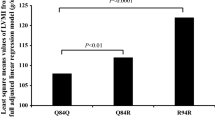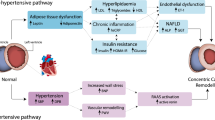Abstract
Patients with chronic heart failure (CHF) express enhanced catabolic metabolism finally resulting in overall weight loss, whereas adipokines might play a crucial role in signaling among tissues. The aim of this study was to investigate the possible associations of defined variability in leptin (dbSNP ID rs7799039), proopiomelanocortin (dbSNP ID rs3754860 and dbSNP ID rs1009388), and leptin receptor gene (dbSNP rs1137101) with CHF and evaluate their potential as the CHF susceptibility genes. The case-control study comprised a total of 372 patients of Caucasian origin with chronic heart failure (New York Heart Association [NYHA] functional classes II–IV, ejection fraction (EF) <40%) and 407 healthy controls. They were genotyped for the leptin (LEP) −2548 G/A, leptin receptor (LEPR) Gln223Arg, and proopiomelanocortin (POMC) RsaI (5′-untranslated region) and C1032G variants (intron 1) using PCR-based methodology. No case-control differences in genotype as well as allele frequencies were observed between CHF patients and controls. We constructed POMC RsaI/C1032G haplotypes, having found no significant association with body mass index (BMI), left ventricle ejection fraction (LVEF), left ventricle hypertrophy (LVH) and diabetes mellitus (DM). Multivariate regression analyses revealed an approximately 2-fold risk for NYHA class IV associated with the LEPR Gln223Arg (P = 0.0000001, odds ratio [OR] = 2.10, 95% confidence interval [CI] = 1.56−2.84); it also displayed an independent prediction role for LVEF in heart failure cases of all etiologies (P = 0.002, OR = 4.05, 95% CI = 1.36−10.06). In subanalyses according to CHF etiology the LEPR Gln223Arg showed an independent prediction role for NYHA IV in IHD patients (P = 0.0001, OR = 2.50, 95% CI = 1.69−3.82) and both for NYHA IV(P = 0.007, OR = 2.04, 95% CI = 1.20−3.84) and LVEF (P = 0.004, OR = 11.87, 95% CI = 2.08−55.6) in DCMP patients. The role of the polymorphic variants in the genes encoding for adipokines as potential CHF susceptibility genes is unclear. Based on our findings, the LEPR Gln223Arg polymorphism could be considered a disease susceptibility modulating factor both in ischemic heart disease or dilated cardiomyopathy patients.
Similar content being viewed by others
References
Clark AL, Poole-Wilson PA, Coats AJ (1996) Exercise limitation in chronic heart failure: The central role for periphery. J Am Coll Cardiol 28:1092–1102
Soderberg S, Stegmayr B, Ahlbeck-Glader C, Slunga-Birgander L, Ahren B, Olsson T (2003) High leptin levels are associated with stroke. Cerebrovasc Dis 15:63–69
Soderberg S, Ahren B, Jansson JH, Johnson O, Hallmans G, Asplund K, Olsson T (1999) Leptin is associated with increased risk of myocardial infarction. J Intern Med 246:409–418
Soderberg S, Ahren B, Stegmayr B, Johnson O, Wiklund PG, Weinehall L, Hallmans G, Olsson T (1999) Leptin is a risk marker for first-ever hemorrhagic stroke in a population based cohort. Stroke 30:328–337
Soderberg S, Olsson T, Eliasson M, Johnson O, Ahren B (1999) Plasma leptin levels are associated with abnormal fibrinolysis in men and postmenopausal women. J Intern Med 245:533–543
Haynes WG, Morgan DA, Walsh SA, Mark AL, Sivitz WI (1997) Receptor-mediated regional sympathetic nerve activation by leptin. J Clin Invest 100:270–278
Schulze PC, Kratzsch J (2005) Leptin as a new diagnostic tool in chronic heart failure. Clin Chim Acta 362(1–2):1–11
Piatti P, Di Mario C, Monti LD, Fragasso G, Sgura F, Caumo A, Setola E, Lucotti P, Galluccio E, Ronchi C, Origgi A, Zavaroni I, Margonato A, Colombo A (2003) Association of insulin resistance, hyperleptinemia, and impaired nitric oxide release with in-stent restenosis in patients undergoing coronary stenting. Circulation 108:2074–2081
Matsui H, Motooka M, Koike H, Inoue M, Iwasaki T, Suzuki T, Kurabayashi M, Yokoyama T (2007) Ischemia/reperfusion in rat heart induces leptin and leptin receptor gene expression. Life Sci 80(7):672–680
Mammes O, Betoulle D, Aubert R, Herbeth B, Siest G, Fumeron F (2000) Association of the G-2548A polymorphism in the 5′ region of the LEP gene with overweight. Ann Hum Gen 64(Pt 5): 391–394
Guízar-Mendoza JM, Amador-Licona N, Flores-Martínez SE, López-Cardona MG, Ahuatzin-Trémary R, Sánchez-Corona J (2005) Association analysis of the Gln223Arg polymorphism in the human leptin receptor gene, and traits related to obesity in Mexican adolescents. J Hum Hypertens 19(5):341–346
Lu H, Duanmu Z, Houck C, Jen KL, Buison A, Dunbar JC (1998) Obesity due to high fat diet decreases the sympathetic nervous and cardiovascular responses to intracerebroventricular leptin in rats. Brain Res Bull 47(4):331–335
Dunbar JC, Lu H (2000) Proopiomelanocortin (POMC) products in the central regulation of sympathetic and cardiovascular dynamics: studies on melanocortin and opioid interactions. Peptides 21(2):211–217
Saunders WS, Thornhill JA (1986) Pressor, tachycardic and behavioral excitatory responses in conscious rats following ICV administration of ACTH and CRF are blocked by naloxone pretreatment. Peptides 7(4):597–601
Bachelard H, Pitre M (1995) Regional haemodynamic effects of mu-, delta-, and kappa-opioid agonists microinjected into the hypothalamic paraventricular nuclei of conscious, unrestrained rats. Br J Pharmacol 115(4):613–621
Hager J, Dina C, Francke S, Dubois S, Houari M, Vatin V, Vaillant E, Lorentz N, Basdevant A, Clement K, Guy-Grand B, Froguel P (1998) A genome-wide scan for human obesity genes reveals a major susceptibility locus on chromosome 10. Nat Genet 20(3): 304–308
Rotimi CN, Comuzzie AG, Lowe WL, Luke A, Blangero J, Cooper RS (1999) The quantitative trait locus on chromosome 2 for serum leptin levels is confirmed in African-Americans. Diabetes 48(3): 643–644
Yamaoka-Tojo M, Tojo T, Shioi T, Masuda T, Inomata T, Izumi T (2006) Central neurotranspeptide, alpha-melanocyte-stimulating hormone (alpha-MSH) is upregulated in patients with congestive heart failure. Intern Med 45(7):429–434
Chen Y, Snieder H, Wang X, Kaviya B, McCaffrey C, Spector TD, Carter ND, O’Dell SD (2005) Proopiomelanocortin gene variants are associated with serum leptin and body fat in a normal female population. Eur J Hum Genet 13(6):772–780
Baker M, Gaukrodger N, Mayosi BM, Imrie H, Farrall M, Watkins H, Connell JM, Avery PJ, Keavney B (2005) Association between common polymorphisms of the proopiomelanocortin gene and body fat distribution: a family study. Diabetes 54(8):2492–2496
Echwald SM, Sorensen TD, Sorensen TI, Tybjaerg-Hansen A, Andersen T, Chung WK, Leibel RL, Pedersen O (1997) Amino acid variants in the human leptin receptor: lack of association to juvenile onset obesity. Biochem Biophys Res Commun 233(1): 248–252
Stephens M, Smith NJ, Donnelly P (2001) A new statistical method for haplotype reconstruction from population data. Am J Hum Genet 68:978–989
Stephens M, Donnelly P (2003) A comparison of bayesian methods for haplotype reconstruction from population genotype data. Am J Hum Genet 73:1162–1169
Quanto: Gauderman WJ (2002) Sample size requirements for association studies of gene-gene interaction. Am J Epidemiol 155: 478–484
Cowburn PJ, Cleland JG, Coats AJ, Komajda M. (1998) Risk stratification in chronic heart failure. Eur Heart J 19:696–710
Pulignano G, Del Sindaco D, Tavazzi L, Lucci D, Gorini M, Leggio F, Porcu M, Scherillo M, Opasich C, Di Lenarda A, Senni M, Maggioni AP (2002) Clinical features and outcomes of elderly outpatients with heart failure followed up in hospital cardiology units: data from a large nationwide cardiology database (IN-CHF Registry). Am Heart J 143:45–55
Kalantar-Zadeh K, Block G, Horwich T, Fonarow GC (2004) Reverse epidemiology of conventional cardiovascular risk factors in patients with chronic heart failure. J Am Coll Cardiol 43:1439–1444
Bienertová-Vasků JA, Hlinomaz O, Vasků A (2007) Are common leptin promoter polymorphisms associated with restenosis after coronary stenting? Heart Vessels 22(5)310–315
Matsuoka N, Ogawa Y, Hosoda K, Matsuda J, Masuzaki H, Miyawaki T, Azuma N, Natsui K, Nishimura H, Yoshimasa Y, Nishi S, Thompson DB, Nakao K (1997) Human leptin receptor gene in obese Japanese subjects: evidence against either obesity-causing mutations or association of sequence variants with obesity. Diabetologia 40:1204–1210
van Rossum CT, Hoebee B, Seidell JC, Bouchard C, van Baak MA, de Groot CP, Chagnon M, de Graaf C, Saris WH (2002). Genetic factors as predictors of weight gain in young adult Dutch men and women. Int J Obes Relat Metab Disord 26(4):517–528
Chagnon YC, Wilmore JH, Borecki IB, Gagnon J, Perusse L, Chagnon M, Collier GR, Leon AS, Skinner JS, Rao DC, Bouchard C (2000) Associations between the leptin receptor gene and adiposity in middle-aged Caucasian males from the HERITAGE family study. J Clin Endocrinol Metab 85:29–34
van der Vleuten GM, Kluijtmans LA, Hijmans A, Blom HJ, Stalenhoef AF, de Graaf J (2006) The Gln223Arg polymorphism in the leptin receptor is associated with familial combined hyperlipidemia. Int J Obes 30(6):892–898
White DW, Wang DW, Chua SC Jr, Morgenstern JP, Leibel RL, Baumann H, Tartaglia LA (1997) Constitutive and impaired signalling of leptin receptors containing the Gln-Pro extracellular domain fatty. Proc Natl Acad Sci USA 94:10657–10662
Yiannakouris N, Yannakoulia M, Melistas L, Chan JL, Klimis-Zacas D, Mantzoros CS (2001) The Q223R polymorphism of the leptin receptor gene is significantly associated with obesity and predicts a small percentage of body weight and body composition variability. J Clin Endocrinol Metab 86:4434–4439
Mattevi VS, Zembrzuski VM, Hutz MH (2002) Association analysis of genes involved in the leptin-signaling pathway with obesity in Brazil. Int J Obes Relat Metab Disord 26(9):1179–1185
van Rossum CT, Hoebee B, van Baak MA, Mars M, Saris WH, Seidell JC (2003) Genetic variation in the leptin receptor gene, leptin, and weight gain in young Dutch adults. Obes Res 11(3):377–386
Mergen H, Karaaslan C, Mergen M, Deniz Ozsoy E, Ozata M (2007) LEPR, ADBR3, IRS-1 and 5-HTT genes polymorphisms do not associate with obesity. Endocr J 54(1):89–94
Author information
Authors and Affiliations
Corresponding author
Rights and permissions
About this article
Cite this article
Bienertová-Vašků, J.A., Špinarová, L., Bienert, P. et al. Association between variants in the genes for leptin, leptin receptor, and proopiomelanocortin with chronic heart failure in the Czech population. Heart Vessels 24, 131–137 (2009). https://doi.org/10.1007/s00380-008-1090-5
Received:
Accepted:
Published:
Issue Date:
DOI: https://doi.org/10.1007/s00380-008-1090-5




